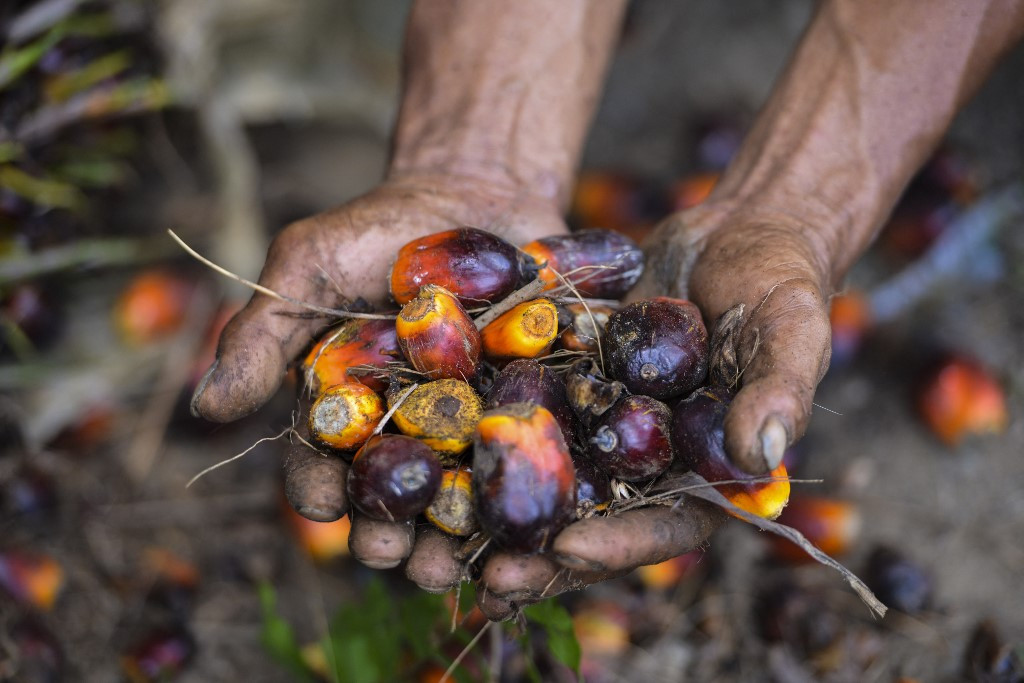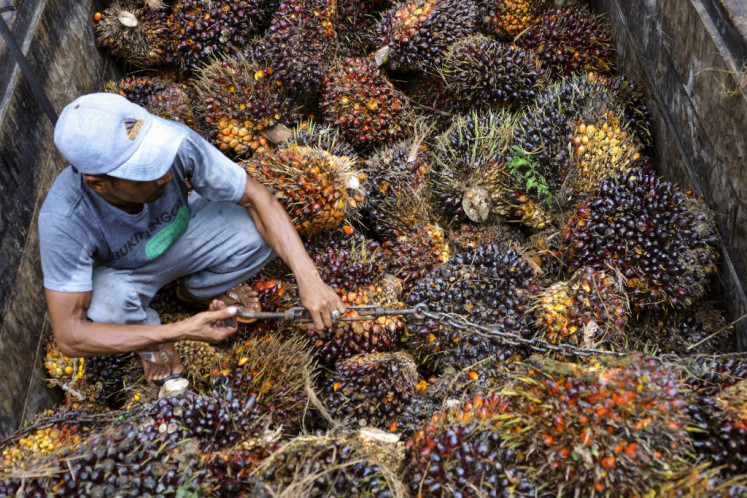Calls mount for Indonesia to extend oil palm moratorium
Industry criticized for causing rampant deforestation
Change Size

E
nvironmentalists and farmers are urging President Joko “Jokowi” Widodo to extend the moratorium on new oil palm plantation permits as part of the country’s efforts to manage the commodity more sustainably.
The moratorium was established through a Presidential Instruction (Inpres) issued in September 2018. It required government agencies to stop granting new licenses for oil palm concessions and to review existing plantations.
The policy was expected to improve palm oil governance, including by clearing up uncertainties about smallholders’ rights and boosting productivity on existing plantations.
The moratorium is slated to expire in September of this year.
Environmental group Greenpeace Indonesia said it was important for the government to extend the ban because the world still questioned palm oil’s environmental impact and sustainability.
“The world has often criticized Indonesia for its palm oil sustainability, as it is in favor of the sustainable economy amid the ongoing climate crisis,” Greenpeace Indonesia forest campaigner Arie Rompas said on Friday.
Read also: Palm oil companies still underestimate deforestation risks, survey shows
He added that it was crucial to address the issue immediately as palm oil was among the country’s top export commodities. In May, palm oil was Indonesia’s top export thanks to high prices on the international market, helping the country book a US$2.36 billion trade surplus that month.
Many criticize the oil palm industry for causing rampant deforestation in the country’s remaining rainforests, a phenomenon that continues to occur.
But the government claims to have logged record low deforestation rates in recent years. According to the Environment and Forestry Ministry, only around 115,000 hectares of forest were lost to deforestation in the 2019-2020 period – down from the 462,500 ha lost in the previous period.
Arie said the low deforestation rate was the result of plantation companies’ “no deforestation, no peat and no exploitation [NDPE]” policies, in which they avoided creating new plantations in natural forest and peatland areas and committed to protecting the rights of workers and local communities.
The government’s moratorium on new business permits for plantations in primary forest and peatland might have also played an important role in the deforestation rate reduction, he added. The primary forest and peatland moratorium was introduced in 2011 and was made permanent in 2019.
But the government does not always effectively review such permits, allowing some firms to develop new oil palm plantations or expand existing ones. The CDP, an international nonprofit organization, cited Agriculture Ministry data showing that the area of plantations had increased from 14 million ha in 2018 to more than 16 million ha in January 2020.
Arie warned that the government would undermine its pledge to reduce greenhouse gas emissions by 29 percent, or 41 percent with international assistance, by 2030 if it did not extend the oil palm moratorium. The forestry sector has been the largest contributor to the country’s emission reduction efforts.
Read also: Two years on, ban on new palm oil plantations brings little change
Not extending the moratorium would also let the Job Creation Law go unchecked, Arie continued, as more investment came into the country, including funds directed toward the expansion of oil palm plantations.
A 2021 government regulation on spatial conflict settlement, which is a derivative regulation of the jobs law, grants three years of amnesty for concessions inside primary forest or peatland areas – an issue supposed to have been addressed by the palm oil moratorium.

Palm oil smallholder associations, including the Palm Oil Farmers Union (SPKS), also called on President Jokowi to extend the moratorium in an open letter dated June 24, contending that it would be beneficial for smallholders’ livelihoods.
SPKS secretary-general Mansuestus Darto said the government’s efforts to improve smallholders’ livelihoods would be in vain if the moratorium were not extended.
Indonesia had a surplus of 5 million tons of crude palm oil in 2020, even though many large concession owners had yet to cultivate all of their land.
Without the moratorium, smallholders would get the short end of the stick if the commodity’s price on the international market dropped again, Mansuetus said. Large firms, on the other hand, only needed to expand their plantations to limit losses resulting from decreased prices.
“We might need to consider a long-term moratorium for large plantations while still allowing smallholders to expand theirs on their private land,” Mansuestus said, adding that the moratorium extension should focus on improving the supply chain and empowering smallholders.
Read also: Indonesian biofuel drive still threatens forests, climate target: Report
Usep Setiawan, an expert presidential staff member on agrarian and rural issues, said the government had acknowledged its desire to extend the moratorium, with the Office of the Coordinating Economic Minister and related ministries and agencies currently evaluating the Inspres and its implementation.
“We’re open to any options [on the extension]. The President has asserted his commitment to improving palm oil governance from the top to bottom,” Usep told The Jakarta Post on Friday.









